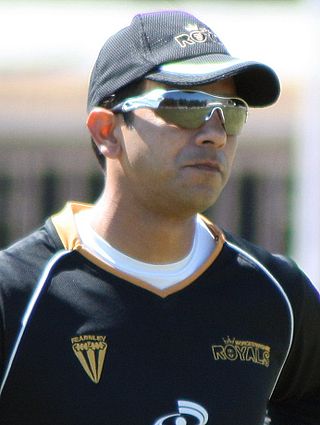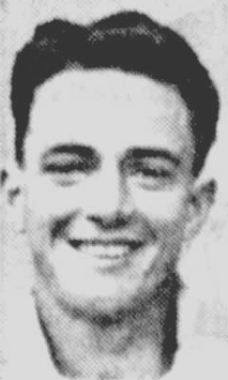Related Research Articles

Vikram Singh Solanki is an English cricket coach and former first-class cricketer. In limited over international cricket, he played over 50 One Day Internationals for England as a batsman and occasional off-spinner.
Philip John Newport is a former English first-class cricketer, who played primarily as a seam and swing bowler. Newport was a stalwart of Worcestershire County Cricket Club for most of the 1980s and 1990s, and played a key part in the county's triumphs in the late 1980s. Newport played in three Test matches for England between 1988 and 1991. He was born at High Wycombe in 1962.

George Frederick Wheldon was an English sportsman. In football, he was an inside-forward with good footwork and an eye for goal who played for England and several Football League clubs, in particular for Small Heath and Aston Villa. In cricket, he was a right-handed batsman and occasional wicket-keeper, who played county cricket for Worcestershire in their early seasons in the first-class game.

Richard Howorth was an English cricketer who played as an all-rounder for Worcestershire County Cricket Club between 1933 and 1951. Chiefly remembered as a left-arm orthodox spin bowler, Howorth also occasionally bowled medium pace and was a capable hard-hitting left-handed batsman. Ideally he would bat in the middle of the order, but so weak was Worcestershire's batting for much of his career that Howorth would often play as an aggressive opener, and it was in this role that he hit his two highest first-class scores – curiously both being 114. Howorth was also a dependable close-to-the-wicket fielder but would field with skill further out if needed.
Arthur Joseph Conway was an English cricketer: a right-handed batsman and right-arm fast bowler who played 29 times for Worcestershire between 1910 and 1919.
Michael Burns is an English first-class list cricket umpire and former first-class cricketer who played county cricket for Warwickshire and Somerset in a first-class career which spanned from 1992 until 2005. He also played Minor Counties cricket for Cumberland and Cornwall. An adaptable cricketer, he appeared for Cumberland and Warwickshire as a wicket-keeper, but when he moved to Somerset he developed into an aggressive batsman who bowled at medium-pace when needed.
John Alexander Cuffe was an Australian-born English first-class cricketer who played more than 200 times for Worcestershire between 1903 and 1914, having previously made a single appearance for New South Wales. After retiring from county cricket, he stood as an umpire for three years in the 1920s. He also played at least once as a professional for Lowerhouse in the Lancashire League. It was wrongly thought until 2019 that Cuffe was also a footballer and played ten seasons for Glossop North End in the Football League Second Division. The footballer was a different John Cuffe, born in Glossop.
Humphrey Adam Gilbert was an Indian-born English first-class cricketer who played in 118 matches. All of these were in England, with the majority for Worcestershire and Oxford University. Very much a specialist bowler, his Wisden obituary commented that "His qualities as a batsman [could] be gauged from the fact that in his five innings against Cambridge he scored one run." He was nicknamed Barmy Gilbert.
Karl Robert Brown is an English cricketer. He is a right-handed batsman and a right-arm medium-pace bowler who played for Lancashire until 2018. Brown made his first-class debut in 2006 and his list A debut the following year. Between 2005 and 2007, Brown played 15 Youth One Day Internationals. In 2011, Brown scored his maiden centuries in first-class and list A cricket and debuted for Lancashire in twenty20s.
John Bernard Higgins was an English first-class cricketer and umpire. As a player, he made 121 appearances between 1912 and 1930, having earlier played in the Minor Counties Championship for Staffordshire. The great majority of his first-class matches were for Worcestershire, though he also played in India for the Europeans and, once, a joint "Europeans and Parsees" side. He umpired four first-class games, including one Test match.
Arthur Jepson was an English first-class cricketer who played for Nottinghamshire before becoming an umpire. In addition to cricket he was also an accomplished football goalkeeper who played over 100 games in the Football League before turning his hand to management.
William Victor Fox was an English sportsman who played both cricket and football to a high level.

Frank Belmont Warne was an Australian first-class cricketer who played for teams on four continents during a 95-game career that stretched from the mid-1920s to the early 1940s.
Steven Joseph "Steve" O'Shaughnessy is a former English professional cricketer who played for Lancashire and Worcestershire in the 1980s, and then had a substantial career in Minor Counties cricket with Cumberland. Since retiring from playing, he has become an umpire, and was promoted in December 2010 to the first-class panel for the 2011 season.
Paul Bent is a former English cricketer who played first-class and List A cricket for Worcestershire between the mid-1980s and early 1990s.
Robert George Mallaby Carter, is a former English cricketer who played first-class and List A cricket for Worcestershire. He was capped by the county in 1965, and was awarded a benefit season in 1973, which raised about £7,000. All but two of his 523 first-class wickets came for Worcestershire; the others were obtained for Marylebone Cricket Club (MCC) in the very last game of his career. Carter's batting was generally extremely poor, as evidenced by his career batting average of under five in both forms of the game, although he did play one significant – if ultimately fruitless – innings. In the 1963 Gillette Cup final against Sussex at Lord's, he came to the wicket with Worcestershire 133/9, needing 35 runs to win. In fading light, he and wicket-keeper Roy Booth added 21 before Carter was run out to end the match. Carter also played in a critical close finish the following season against Nottinghamshire, where he and Flavell managed to get home by a single wicket and virtually seal the county's first Championship title.
Alan Paul Pridgeon is a former English cricketer who played first-class and List A cricket for Worcestershire County Cricket Club, taking 530 first-class and 273 List A wickets for the county between the early 1970s and the late 1980s. He was capped by the county in 1980. He played football in the winters as a centre-half for Stourbridge F.C.
Stephen Peter Perryman is a former English cricketer who played first-class and List A cricket for Warwickshire and Worcestershire during the 1970s and 1980s.
John Darling Inchmore is a former English cricketer who played first-class and List A cricket for Worcestershire during the 1970s and 1980s. He also played briefly for Northern Transvaal, and later for Wiltshire.
Roy Collins was an English cricketer. Collins was a right-handed batsman who bowled right-arm off break. He was born at Clayton, Manchester, Lancashire.
References
- ↑ Lancashire chief executive Jim Cumbes retires after 50-year career in professional sport Retrieved 26 December 2012
- Lancashire Spin Magazine, Summer 2006 Edition